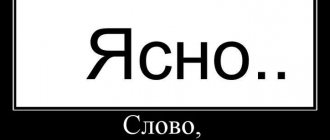In a normal human society, praise and gratitude are an integral part of communication, however, in Russia, many people are not used to hearing either one or the other addressed to them, and even more so are not used to praising and thanking other people. That is why half of the inhabitants of our country walk around gloomy and frowning. People try their best to live as they were taught, but in return they only get sullen looks from others. And what is most terrible in this picture is that if a person did not encounter praise and gratitude in childhood, if the parents did not take care of teaching their child normal communication, if they themselves were not used to praising other people and especially responding correctly, then the slightest encounter with praise or gratitude in adult life can put such people in an awkward position, only discouraging the desire to communicate with decent people.
There are different reasons for dislike of compliments and praise:
- Fear of appearing arrogant, because by agreeing to praise, he may seem arrogant and imaginary, inflating his worth;
- Reluctance to be obligated to someone (after compliments, especially long-lasting and emotional ones, a person feels the need to do something pleasant in return);
- Low self-esteem, which often causes distrust of praise. In people with low self-esteem, a compliment is perceived as an undeserved reward and is immediately denied;
- Search for hidden motives. People who have had to deal with deception and meanness have a habit of excessive suspicion, and when faced with praise or a compliment, they see it as flattery and begin to look for the “reason for praise” or, in other words, the benefit that the person who made the compliment wants to receive.
We talk about how to learn to respect other people and thank you correctly in the corresponding article, but here we will talk about how to correctly accept words of praise and gratitude without scaring away the people who utter them.
Let's look at the most common mistakes when greeting compliments or gratitude:
- Completely ignoring what was said. Silence in response to a compliment, just like in response to gratitude, can confuse the person praising, and he will begin to think: “was it worth saying all this?” Therefore, even if you are confused and don’t know how to answer, say at least “Thank you”, or “Please” if you were thanked.
- You can limit yourself to the words “thank you” and “please”, but try to do this as rarely as possible.
- Embarrassment in response to a compliment and gratitude shows your opponent your lack of self-confidence. By not being able to accept compliments, you seem to prohibit people from admiring your person.
- If you are praised in writing, do not limit your response to an emoticon; find the strength to choose words as well.
- Never judge a compliment, even if it seems inappropriate and awkward to you. By condemning a compliment in your direction, you will not only cause offense, but also lose respect in the eyes of your interlocutor.
- If, in response to a compliment or gratitude, you answer “That’s my job!”, Don’t be surprised that they stopped praising you.
- The answer is “Yes, I know, that’s who I am!” sounds too arrogant.
- At the same time, the answer to transfer your merits to someone else (“if it weren’t for a fair wind, the result would not have been so good”) in order to reduce the feeling of one’s arrogance is also not worth it.
- You shouldn’t immediately respond to a compliment with a compliment, it looks fake. If you also want to reciprocate, do it a little later so that the compliment seems spontaneous and sincere.
- Belittling your own merits is not good for you. By answering “I didn’t do anything special,” you make your opponent doubt your words, deprive yourself of the opportunity to receive a repeat compliment or gratitude, and worse, devalue your work.
- Answering “Do you really think so?” you force your opponent to repeat and strengthen the compliment, which may seem unpleasant to him.
- Denying is also a bad idea, as it also confuses your opponent.
So how do you respond if there are so many restrictions? We have tried to compile for you a list of the most successful phrases for responding to a compliment or gratitude. And remember that when answering, it is useful to forget about unnecessary modesty, embarrassment, and take the opportunity to experience pride and pleasure.
Is it necessary to respond to gratitude?
Let's try to put ourselves in the shoes of the person thanking. Having said the cherished word, you do not specifically expect anything in response. But how nice it would be to see or hear kind words in return!
These may not be words, but a gesture or a fleeting smile, an expression of a glance. Such “little things” can preserve a good impression of a polite person for a long time. Exaggerating a bit, we can say: you would like it.
In any case, simply turning away and going about your business in response to a “thank you” is rude and can be upsetting.
But every rule has exceptions. Sometimes the word “thank you” has the opposite meaning and is pronounced with sarcasm, mockery or anger. In this case, the person does not thank, but expresses his resentment or anger: “thank you for the broken car,” “thank you for being late,” “thank you for the ruined evening.” Here it is better to remain silent in response or apologize for the mistake.
How to respond to “thank you” to a girl?
Girls are special creatures and they expect an original response to gratitude, especially if she likes you. Of course, no one will forbid using the above-mentioned expressions, but you can show your imagination. Include romantic notes in your answer (of course, if you are not indifferent to the girl):
- I'm ready for anything for you;
- Beautiful girls don't have to say thank you;
- Why, it’s only a joy for me to help you;
- For your sake, I am ready to get a star from the sky.
Other answers can be thought up depending on the situation. If you don’t know the girl, and you helped her get out of public transport, you can simply say “please”.
Girls really like it when they pay attention, so use your imagination and try not to talk in cliches and clichés. You can even give the girl some kind of present (a flower or a chocolate bar), although it would seem that she is the one thanking you. But remember that girls love when you think about them and take care of them.
If you give flowers for no reason, she will treat you much better, and you will grow in her eyes.
Verbal response to gratitude
The easiest way to respond to “thank you” is “please”, it’s that simple! But people with poor communication skills sometimes have difficulty expressing emotions verbally. That is why this also needs to be taught to everyone from childhood.
Let's consider the options for verbal answers:
- Please;
- do not mention it;
- I was glad to help you;
- contact;
- you're welcome;
- I was pleased to do this;
- nothing, it wasn’t difficult for me;
- if necessary, I will do it again;
- If you have any problem, please contact me again;
- and thank you very much for asking for help;
- to your health (if you thanked me for a delicious lunch).
There are so many possible options, and that's not all. Each response to a grateful “thank you” depends on the specific situation, on the people, on their position. It should be taken into account that a rather boring “you’re welcome” in some way diminishes the value of the service provided.
You can solve the “thank you, please” problem in another language, but to do this you need to be sure that you will be understood. For example, answer in English, which is now very popular:
- do not mention it;
- not at all;
- was glad to help.
Business conversation
The norms of etiquette, like language, are a fickle phenomenon, subject to change. For example, a couple of centuries ago, instead of the word “thank you,” people used “thank you” or even “very grateful.” Today these expressions are a thing of the past.
But consider this: expressing gratitude from someone gives you some perspective. For example, you understand that you did something truly important and good for him. Therefore, when he says: “Thank you very much!” - you can answer: “Come on, it’s not worth it.”
This is one option. But you can also respond to gratitude with the phrase: “I have no doubt that you will do the same for me.” Or at least say simply: “We’ll work it out.” In this case, the message will be different: you are moving your communication with the person to the level where you can freely turn to each other with requests. You also remind your interlocutor that you will not refuse to accept his gratitude in the future.
Perhaps you are now uncomfortable with the calculation of such answers. However, don't worry. The relationship “you - to me, I - to you” is the norm for human interaction. After all, such an answer does not mean that having done something good for a person, you will certainly demand retribution. But if you ever find yourself in a difficult situation and need to ask for help, it is easier to ask for it from someone who is potentially willing to return the favor.
Experiments by psychologists
From a psychological point of view, “no way” symbolizes a sign of lost benefit (benefit). It's better to choose something more acceptable. A very sophisticated answer is advised by the famous psychologist Robert Cialdini: “I’m sure you would do the same for me.” In this simple way, reciprocity begins. There is a feeling that good will be repaid with good (in the future tense).
Adam Grant considered it wrong to hint to a person about a future “return of the good deed.” And he slightly altered Cialdini’s phrase: “... I was glad to help, you would probably have done the same for me.” This removes the “aftertaste” from the first option, and the person does not feel like a debtor.
Polite requests and phrases in English
- Skysmart
- Blog
- English language
Words of greeting are where any interaction begins, whether with a friend or a salesperson in a store. There are many options, choose the one that suits you:
- Hi. - Hello.
- Good morning (afternoon, evening). — Good morning (afternoon, evening).
- Hey - Hey
- Hello. - Hello
- Greetings! - Greetings!
- Nice to see you. - Glad to see you.
- I'm so glad to meet you. - I'm so glad to meet you.
- I've heard a lot about you. - I've heard a lot about you.
Reply using gestures
Of course, gestures also help in communication. In no case should you use the irritable “oh, there’s so much to do,” but you had to be distracted by other people’s problems.
But gestures are different, not all are verbally translatable, but each is intuitive. We suggest you study a small list. In response to “thank you” you can do the following:
- just smile cordially, this action works wonders;
- place your palm on your heart and slightly tilt your head;
- imitate a handshake by clasping your own palms and shaking them slightly;
- just nod your head slightly and smile back;
- depict an “air kiss” (for ladies).
This list can be continued with your own options (imagine at your leisure)!
If you gave a gift
The problem for many is the inability to accept gifts. But an even bigger problem is how to respond to “thank you for the gift”, what to say in response?
The main thing is to behave with restraint and confidence. You need to react adequately, there are many options here. Imagine again: you gave a gift, the person rejoices! It's nice, isn't it?
How to respond to “thank you”? The options are as follows:
- I'm glad I pleased you;
- We are glad that you liked the gift (it was about the soul);
- please (don't forget about the simple option);
- do not mention it;
- wear (use) with pleasure.
History of the word "thank you"
All words have one origin or another and the word “thank you” is no exception. In pagan times, our ancestors usually answered “I thank you” (that is, “I give a blessing”). When Rus' adopted Christianity, the word “thank you” came into use.
It is believed that this is an abbreviation of the phrase “God bless!” Previously, people put great meaning into this expression - it was not just gratitude to the interlocutor, but expressed a feeling of gratitude to life. Over time, the expression “God bless” was shortened to the simpler “thank you.”
There is also a version that “thank you” arose even before Christianity and meant “Save, Bai!” (one of the pagan gods). However, most scientists call this version untenable and believe that the modern “thank you” appeared in the 16th century. Nowadays, not a single well-mannered person neglects this word, because it shows the level of politeness and education.
What is not allowed
Under no circumstances should you answer something like: “it’s not expensive”, “we didn’t buy it, I had a gift lying around at home”, “I got it as a present”, “bought it on sale”.
Some gestures are also unacceptable: waving, grinning, mysterious glances. The person who accepts the gift must see the clarity of the situation: you presented the gift with all your heart, and he joyfully accepts it. And no ambiguous hints!
All these words, gestures, facial expressions can not only offend a person, this is a serious request to never be invited into the house again. Therefore, think carefully about how to respond to “thank you.”
It was nothing - Trifles!
Consider an example from Bobby Trout's story “The Signal.” The boys thank Gilbert for saving their lives, and he politely tells them that it was a trifle or a trifle and he was ready to come to the aid of his friends.
- Thank you, Gilbert, said Billy Ray. — I knew one day you would come through.
- “Oh, it was nothing ,” Gilbert replied.
- Nothing,” spoke up Big Sam. “Oh, it was something alright,” he said. - You saved our lives and we are proud of you.
Translation:
- Thank you, Gilbert,” Billy Ray said. “I knew that one day you would come.”
- “Oh, nothing ,” Gilbert replied.
- Trifles? - said Big Sam. “It was something, okay,” he said. “You saved our lives, and we are proud of you.”
Can be used in the present tense - it is nothing.
About women and men
Women love gifts very much, all men know this. But if there is a close relationship in a couple, then the lady can express gratitude in various ways. All of the above are not suitable.
A woman, accepting a gift, may hug back, jump and squeal with happiness. No sour expression or quiet “thank you.” Gratitude in this case can be loud, stormy and always sincere.
Then the man will go crazy in order to constantly give gifts to his beloved and not worry about the topic: “What to answer to “Thank you for the gift”?”
Brief and modern rules of etiquette
Everyone knows that there are certain rules of etiquette that apply in different situations. There are books and courses on etiquette. Let's remember some of these rules.
- You cannot come to visit without calling and warning, it may seem intrusive and impolite;
- It is indecent to use your smartphone if you are talking to people; in a restaurant you should not put it on the table;
- Men should not carry women's bags;
- You should always monitor the condition of your shoes - they should be clean;
- A man walks down the street to the left of a woman (with the exception of military personnel);
- When indoors, a woman must remove her hat and gloves;
- The man enters the elevator first;
- The first person to enter the restaurant is the one who is going to pay;
- When a man shakes hands, he must remove his glove (a woman may not remove it);
- In public transport, men give way to ladies;
- You can smoke in the presence of a woman only with her permission.
The use of polite words and phrases is also part of the rules of good manners. Of course, we have not listed all the rules of etiquette here, but, in our opinion, they are the most important.











